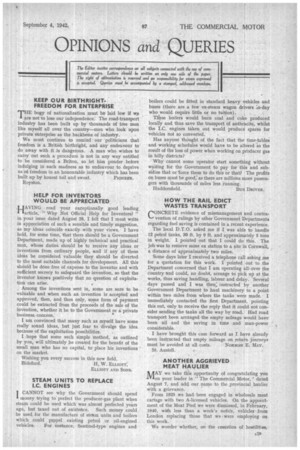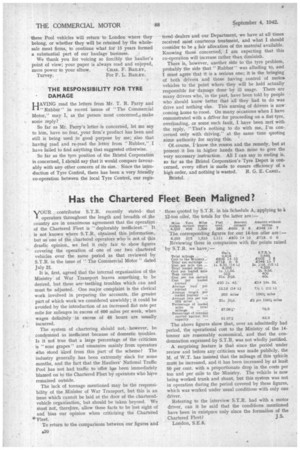OPINIONS and O UERIES KEEP OUR BIRTHRIGHTFREEDOM FOR ENTERPRISE THE bogy of nationalization must be' laid low if we
Page 31

Page 32

If you've noticed an error in this article please click here to report it so we can fix it.
are not to lose our independence. The road-transport industry has been built up by thousands of tree men like myself all over the country—men who look upon private enterprise as the backbone of industry.
We must continue to remind our politicians that freedom is a British birthright, and any endeavour to do away with it is dangerous. A man who wishes to carry out such a procedure is not in any way entitled to be considered a Briton, so let him ponder before indulging in such madness as to endeavour to deprive us of freedom in an honourable industry which has been
built up by honest toil and sweat. PIONEER. Royston.
HELP FOR INVENTORS WOULD BE APPRECIATED .
.LJAVING read your exceptionally good leading
article," Why Not Official Help for Inventors? " in your issue dated August 28, I felt that I must write in appreciation of such a sensible and timely suggestion, as my ideas coincide exactly with your views. I have held, for some time, that there should be a Government Department, made up of highly technical and practical men, whose duties should be to receive any ideas or inventions from ordinary people, and if any of these ideas be considered valuable they should be diverted to the most suitable channels for development. All this should be done free of expense to the inventor and with sufficient secrecy to safeguard the invention, so that the inventor knows positively that no question of exploitation can arise.
. Among the inventions sent in, some are sure to be valuable and when such an invention is accepted and approved, then, and then only, some form of payment could be extracted from the proceeds of the sale of the invention, whether it be to the Government or a private business. concern.
I am convinced that many such as myself have some really sound ideas, but just fear to divulge the idea because of the exploitation possibilities.
I hope that some such simple method, as outlined by you, will ultimately be created for the benefit of the small man who has no capital, to place his inventions on the market.
Wishing you every success in this new field.
Bideford. H. W. ELLIOTT',
ELLIOTT AND SONS.
STEAM UNITS TO REPLACE I.C. ENGINES I CANNOT see why the Government should spend money trying to perfect the producer-gas plant when steam could be used which was almost perfected years ago, but taxed out of existence. Such money could be used for the manufacture of steam units and boilers which could propel existing petrol or oil-engined vehicles. For +instance, Sentinel-type engines and boilers could be fitted in standard heavy vehicles and buses (there are a few ex-steam wagon drivers o-day who would require little or no tuition). Tliese boilers would burn coal and coke produced locally and thus save the transport of anthracite, whilst the I.C. engines taken out would produce spares for vehicles not so converted.
Has anyone thought of the fact that the time-tables and working schedules would have to be altered as the result of the loss of power when working on producer gas in hilly districts?
Why cannot some operator start something without waiting for the Government to pay for this and subsidize that or lorce them to do this or that? The profits on buses must be good; as there are millions more passengers with thousands of miles less running.
. Huddersfield. Bus DRIVER.
HOW THE RAIL EDICT WASTES TRANSPORT CONCEETE evidence of mismanagement and contravention of rulings by other Government Departments regarding fuel saving is contained in a recent experience.
The local D.T.O. asked me if I was able to handle 12 petrol tanks, 30 ft. by 9 ft. and approximately 5 tons in weight. I pointed out that I could do this. The job was to remove same ex station to a site in Cornwall, a distance of approximately two miles.
Some days later I received a telephone call asking me for a quotation for this work. I pointed out to the Department concerned that I am operating all over the country and could, no doubt, arrange to Pick up at the works, thus saving handling, labour and delay. Several days passed and I was then; instructed by another Government Department to haul machinery to a point within two miles from where the tanks were made. I immediately contacted the first Department, pointing this out, only to receive the reply that it could not consider sending the tanks all the way by road. Had road transport been arranged the empty mileage would have been nil and the saving in time and man-power considerable.
I have brought this case forward as I have already been instructed that empty mileage on return journeys must be avoided at all costs. NORMAN E. MAY. St. Austell.
ANOTHER AGGRIEVED MEAT HAULIER 1/TAY we take this opportunity of congratulating you aVlon your leader in "The Commercial Motor, dated August 7, and add our name to the provincial hatliet with a grievance.
From 1925 we had been engaged in wholesale meat cartage with two A-licensed vehicles. On the appointment of the Meat Pool we were dismissed, in February, 1940, with less than a week's notice, vehicles from London replacing those that we 'were employing on this work.
We wonder whether, on the cessation of hostilities,
these Pool vehicles will return to London where they belong, or whether they will be retained by the wholesale meat firms, to continue what for 15 years formed a substantial part of our haulage business.
We thank you for voicing so forcibly the haulier's point of view; your paper is always read and enjoyed, more power to your elbow. Cs. F. BAILEY, Turvey. For F. L. BAILEY.
THE RESPONSIBILITY FOR TYRE • DAMAGE HAVING read the letters from Mr. T. R. Parry and " Rubber" in recent issues, of "The Commercial Motor," may I, as the person most concerned,p make some reply? , So far as Mr. Parry's letter-is concerned, let me say to him, have no fear, your firm's product has been and still is being used to good purpose by me; also that having read and re-read the letter from "Rubber," I have failed to find anything that suggested otherwise.
So far as the tyre position of the Bristol Corporation is concerned, I should say that it would compare favourably with any other concern of its size. r Since the introduction of Tyre Control, there has been a very friendly co-operation between the local Tyre Control, our regis tered dealers and our Department, we have at all times received most courteous treatment, and what I should consider to be a fair allocation of the material available. Knowing those concerned, I am expecting that this co-operation will increase rather than diminish.
There is, however, another side to the tyre problem, probably the side that " Rubber " was alluding to, and I must agree that it is a serious one; it is the bringing of both drivers and those having control of motor" vehicles to the point where they will be held actually responsible for damage done by ill usage. There are many drivers who, in the past, have been told by people who should know better that all they had to do was drive and nothing else. This nursing of drivers is now ,coming home to roost. On many occasions when I have remonstrated with a driver for proceeding on a fiat tyre, overloading, or some such fault, .I have been met with the reply, "That's nothing to do with me, I'm concerned only with driving," at the same time quoting some authority for saying this.
Of course, I-know the reason and the remedy, but at present it lies in higher hands than mine to give the very necessary instruction. All I can say in ending is, so far as the Bristol Corporation's Tyre Depot is concerned, every effort is made to ensure efficiency of a high order, and nothing is wasted. R. G. E. CANEL, Bristol.




















































